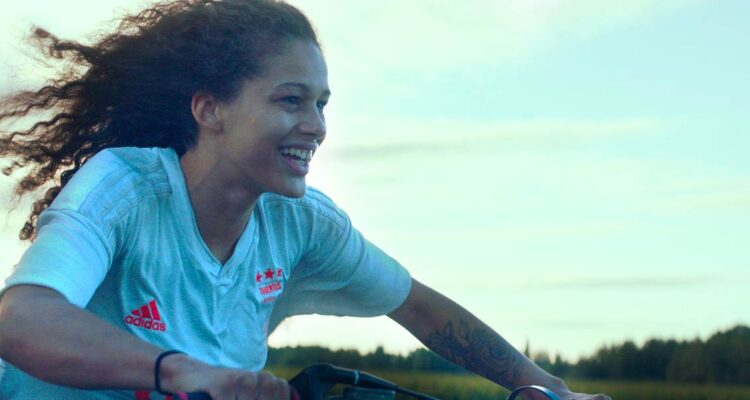It’s hard not to sound like a cynical, world-weary film critic when complaining about seemingly small things such as the way many independent French dramas these days open with a sequence showing people fighting and shouting at each other. But the technique of stunning the audience and capturing their attention with a loud, conflictual scene is becoming a tired trope that, if filmmakers aren’t careful, can seem more like a superficial shortcut to gritty realism than anything truly rooted in the characters’ reality.
READ MORE: Cannes Film Festival 2022 Preview: 25 Must-See Films To Watch
“Rodeo,” the first fiction feature from French director Lola Quivoron, opens with one such scene and, as it goes on, continues to find itself torn between more conventional storytelling and something altogether stranger. Set in the world of adventurous motorcycle riders, whose illegal “rodeos” see them do tricks on their loud machines on empty sections of road until the cops come to chase them away, the film has the classical structure of an initiatory journey, following an outsider who tries to prove themselves to the people whose ranks they hope to join. The difference here is that this newcomer is a girl, attempting to enter a resolutely male world: Julia (Julie Ledru) is already obsessed with motorcycles when the film opens, but it’s a passion she enjoys on her own. We understand why when she first tries to join a rodeo and we see the role assigned to most girls in that community: to stand on the side of the road and cheer on the boys.
Julia gets the opportunity to come closer to her dream when she helps members of a group of drivers who got hurt in a dramatic accident. Thankfully, after this episode, the film nicely avoids making her an empty vessel for all the drama that happens around her — a failing that afflicts too many similar coming-of-age / sports movies. Quivoron’s attempts to suggest a mysterious past for Julia (we never find out why is she so good at giving first aid, or why her family doesn’t want to see her again) are less convincing in that regard than Ledru herself, who imbues her character with enough personality to power a small engine. The dark circles under her eyes, her muscular body and the loose sports clothes she wears indicate she does not embrace classical feminine codes; but her fiercely confident way of being and the total absence of restraint in her demeanor give the sense of someone who exists far beyond any simplistic binary notion of gender. One striking sequence shows the two distinct ways in which boys and girls dance and have fun: the former jump in place, push each other, scream song lyrics and climb on top of cars and vans, while the latter gently move around in their heels, undulate their bodies and regularly put their hair back in place. Julia, meanwhile, ends up dancing around a fire alone, frenetically swinging her arms and head around as though in a trance.
Though some of her time spent within the group — which, besides a rodeo crew, turns out to be a motorcycle repair operation led by a man who FaceTimes his employees from prison — is initially dedicated to learning the ropes of the business and finding her place, the film soon swerves away from that clichés, understanding that it is much more interesting to see her take charge of the story. A real force of nature, ready to grab any opportunity she gets to come closer to her dream, Julia is ultimately what thrusts the film forward, and “Rodeo” is at its most thrilling when she suggests increasingly dangerous schemes to make money but also, and most importantly in her eyes, to get hold of better bikes.
Julia’s passion for riding motorcycles is incredibly pure, simple, and something she would never compromise on, to the point of risking her life but also, as Quivoron shows, of ending up all alone. Kaïs (Yanis Lafki, another promising discovery) is the young man of the group most sympathetic to Julia, and perhaps the only one who seems to recognize and respect the purity and primacy of Julia’s desire. But for how long? Through her relationship with Ophélie (Antonia Buresi), the boss’s wife, Julia becomes acutely aware of how men can sometimes clip the wings of the woman they love just to keep her close.
All those elements paint the picture of a world of dead ends for young girls like Julia, a feeling Quivoron aims to contrast with footage of the bikes, their loud sound like a defiant roar. But those images nevertheless give the sense of someone too familiar with the milieu to give the uninitiated a true feeling of its emancipatory and thrilling power. Rather misjudged dips into the realm of fantasy likewise fail to lift up proceedings, but “Rodeo” is at its best when it stays down to earth, close to the pavement. [B]
Follow along with all our coverage from the 2022 Cannes Film Festival.

